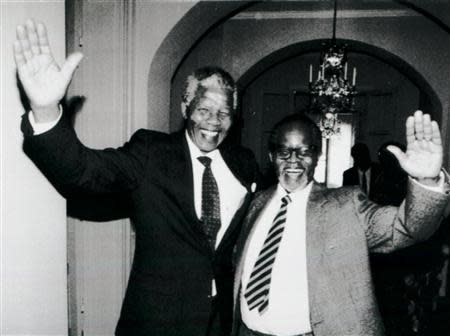Nelson Mandela Was Prepared to Die 49 Years Ago

Nelson Mandela was prepared to die.
--
More from NJ: Is Tom Cotton Too Good to Be True?
It's April 1964, and a crowd of black onlookers jostle in the back of a Johannesburg courtroom as Nelson Mandela rises from his chair before the judge. They sit segregated from the rest of the court, and have to crane their necks to catch a glimpse of the nationalist leader who has already served five years in prison. Armed guards are stationed at the exits of the room, "a high-domed chamber with an antique ceiling fan and a rococo atmosphere that suggests the American South," as Robert Conley, the future founding host of All Things Considered, describes for The New York Times.
More from NJ: Obama, Detroit, and the New Gilded Age
Not lost on this American writer is the commonality of history between the continents. A black man stands before a white judge defending an outlawed ideal he believes in. The moment mirrors America's own civil-rights movement. Martin Luther King had written his Letter From a Birmingham Jail almost exactly a year earlier. But the mirror is a magnifier. However wrong, horrible, and unfair America's treatment of black men and women was, in South Africa, it was objectively worse. Black Africans had no right to vote, no right to strike from work. Six years later, they would be denied citizenship in their own country.
More from NJ: Millennials Abandon Obama and Obamacare
Mandela speaks, standing convicted of sabotage, knowing he faces a life in a cell or death as a martyr. "I have cherished the ideal of a democratic and free society in which all persons live together in harmony and with equal opportunities," he says. "It is an ideal which I hope to live for and to achieve. But if needs be, it is an ideal for which I am prepared to die."
(Abridged from the original text. Find it here.)
I am the first accused. I hold a bachelor's degree in arts and practiced as an attorney in Johannesburg for a number of years in partnership with Oliver Tambo. I am a convicted prisoner serving five years for leaving the country without a permit and for inciting people to go on strike at the end of May 1961....
Some of the things so far told to the court are true and some are untrue. I do not, however, deny that I planned sabotage. I did not plan it in a spirit of recklessness, nor because I have any love of violence. I planned it as a result of a calm and sober assessment of the political situation that had arisen after many years of tyranny, exploitation, and oppression of my people by the whites....
In 1960 the government held a referendum which led to the establishment of the republic. Africans, who constituted approximately 70 percent of the population, were not entitled to vote, and were not even consulted. I undertook to be responsible for organising the national stay-at-home called to coincide with the declaration of the republic. As all strikes by Africans are illegal, the person organising such a strike must avoid arrest. I had to leave my home and family and my practice and go into hiding to avoid arrest. The stay-at-home was to be a peaceful demonstration. Careful instructions were given to avoid any recourse to violence....
The complaint of Africans, however, is not only that they are poor and the whites are rich, but that the laws which are made by the whites are designed to preserve this situation. There are two ways to break out of poverty. The first is by formal education, and the second is by the worker acquiring a greater skill at his work and thus higher wages. As far as Africans are concerned, both these avenues of advancement are deliberately curtailed by legislation....
Above all, we want equal political rights, because without them our disabilities will be permanent. I know this sounds revolutionary to the whites in this country, because the majority of voters will be Africans. This makes the white man fear democracy. But this fear cannot be allowed to stand in the way of the only solution which will guarantee racial harmony and freedom for all. It is not true that the enfranchisement of all will result in racial domination. Political division, based on color, is entirely artificial and, when it disappears, so will the domination of one colour group by another. The ANC has spent half a century fighting against racialism. When it triumphs it will not change that policy....
During my lifetime I have dedicated myself to this struggle of the African people. I have fought against white domination, and I have fought against black domination. I have cherished the ideal of a democratic and free society in which all persons live together in harmony and with equal opportunities. It is an ideal which I hope to live for and to achieve. But if needs be, it is an ideal for which I am prepared to die.
He was sentenced to life in prison shortly thereafter.
More from NJ:

